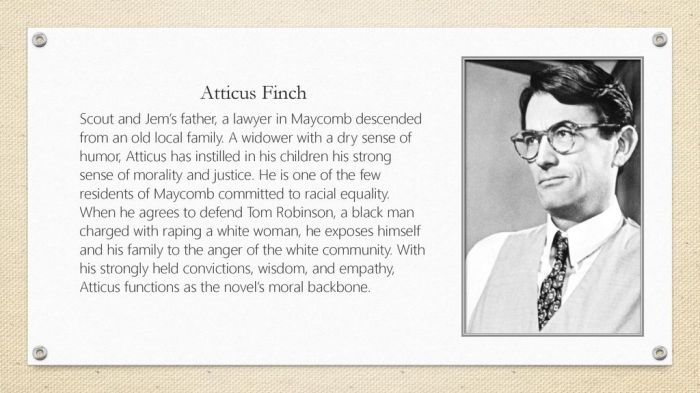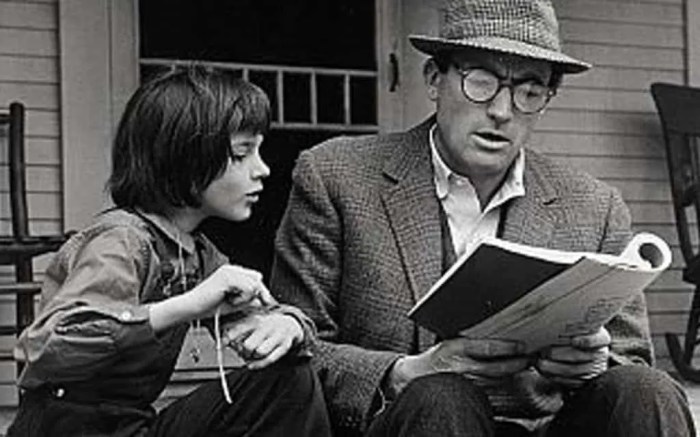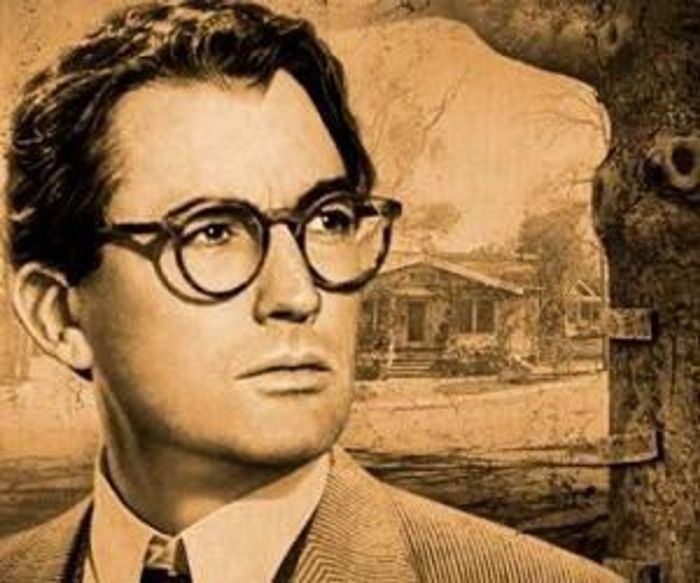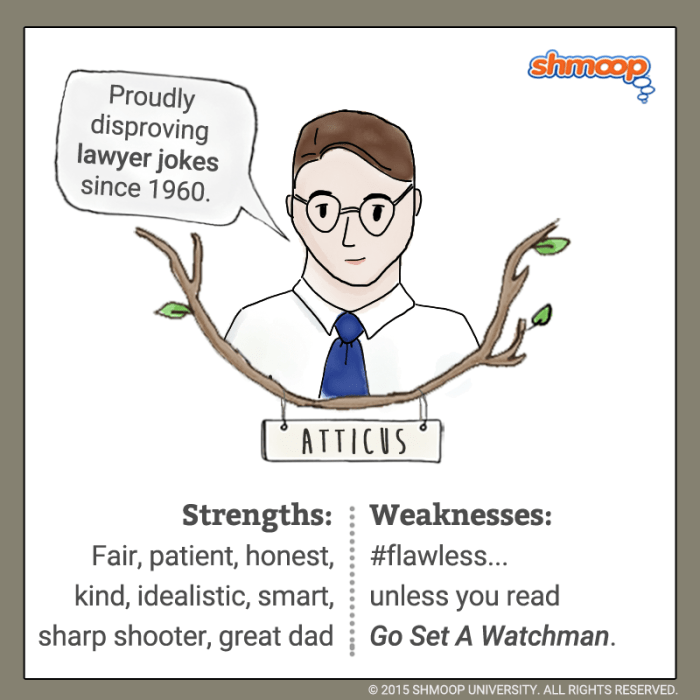Adjectives to describe Atticus Finch, the esteemed literary character from Harper Lee’s “To Kill a Mockingbird,” provide a profound understanding of his multifaceted personality. This analysis delves into the rich tapestry of his ethical, intellectual, and interpersonal attributes, unraveling the complexities that make him an enduring symbol of integrity and virtue.
Atticus Finch embodies a rare combination of unwavering principles, sharp intellect, and compassionate relationships. His unwavering sense of justice, coupled with his exceptional legal acumen, sets him apart as a beacon of hope in a society grappling with racial injustice.
Through his interactions with his children, Scout and Jem, and his unwavering commitment to the community, Atticus Finch emerges as a towering figure of strength and resilience.
Descriptive Adjectives

Adjectives play a crucial role in shaping the portrayal of Atticus Finch’s character in Harper Lee’s “To Kill a Mockingbird.” They vividly capture his distinct personality traits, ethical values, and unwavering integrity.
Atticus Finch is often described using adjectives that highlight his:
Moral Integrity
- Just
- Principled
- Fair-minded
- Empathetic
Intellect and Wisdom
- Intelligent
- Knowledgeable
- Insightful
- Perceptive
Courage and Determination
- Courageous
- Determined
- Unwavering
- Resolute
Humility and Modesty
- Humble
- Modest
- Selfless
- Unassuming
Ethical and Moral Attributes
Atticus Finch, the protagonist of Harper Lee’s “To Kill a Mockingbird,” embodies a steadfast adherence to ethical principles that guide his actions and define his character. His unwavering sense of justice and fairness permeates every aspect of his life, shaping his interactions with others and his pursuit of truth.
Unwavering Sense of Justice
Atticus’s commitment to justice is unwavering. He believes in the inherent dignity of all people, regardless of their race, class, or background. He is willing to stand up for what is right, even when it is unpopular or personally costly.
His defense of Tom Robinson, a black man falsely accused of rape, exemplifies his unwavering belief in the rule of law and the right to a fair trial.
Sense of Fairness
Atticus’s sense of fairness extends beyond the courtroom. He treats everyone with respect and compassion, regardless of their circumstances. He believes that all people deserve to be treated with dignity and that their voices should be heard. His interactions with his children, Scout and Jem, demonstrate his belief in the importance of teaching children about fairness and equality.
Courage and Integrity
Atticus’s ethical and moral attributes are underpinned by his courage and integrity. He is not afraid to speak his mind or stand up for what he believes in, even when it is difficult. His refusal to compromise his principles, even in the face of adversity, serves as a testament to his unwavering moral compass.
Humility and Empathy
Despite his strong moral convictions, Atticus remains humble and empathetic. He recognizes his own limitations and is willing to learn from others. His ability to see the world from different perspectives allows him to connect with people on a deep level and understand their struggles.
Intellectual and Professional Abilities: Adjectives To Describe Atticus Finch

Atticus Finch, the protagonist of Harper Lee’s “To Kill a Mockingbird,” possesses an astute intellect and remarkable legal acumen. His sharp mind, strategic thinking, and exceptional courtroom skills contribute significantly to his effectiveness as an attorney.
Exceptional Courtroom Skills
Atticus’s courtroom abilities are unparalleled. He possesses a deep understanding of the law and can effectively present complex legal arguments. His ability to connect with the jury, appeal to their emotions, and sway their opinions is a testament to his exceptional courtroom skills.
- In the trial of Tom Robinson, Atticus delivers a powerful closing argument that appeals to the jury’s sense of justice and equality, despite the overwhelming evidence against his client.
- He effectively cross-examines the prosecution’s witnesses, exposing inconsistencies and weaknesses in their testimonies.
- Atticus’s ability to think strategically and anticipate the opposing counsel’s arguments allows him to prepare effective countermeasures.
Relationships and Interactions

Atticus Finch is a complex and multifaceted character whose relationships and interactions with others provide insight into his personality and values. As a father, he is loving and supportive, yet firm and principled. As a lawyer, he is respected for his integrity and unwavering commitment to justice, even in the face of adversity.
Interactions with Children
Atticus’s relationship with his children, Scout and Jem, is one of the most important and enduring aspects of his character. He is a patient and understanding father who encourages them to think critically and develop their own opinions. He is also a role model for them, demonstrating the importance of courage, integrity, and compassion.
- Atticus teaches Scout and Jem the value of empathy by encouraging them to consider the perspectives of others, even those they disagree with.
- He sets a high moral standard for his children, expecting them to behave with honesty and integrity.
- Atticus supports Scout’s independence and encourages her to pursue her own interests.
Interactions with the Community
Atticus’s interactions with the community are complex and often challenging. As a lawyer, he is often called upon to defend unpopular causes, which makes him a target of prejudice and discrimination. However, he remains steadfast in his commitment to justice, even when it means putting himself at risk.
- Atticus is respected by the black community for his willingness to defend them, even when it is unpopular.
- He is also respected by many white people in the community, who admire his integrity and courage.
- However, Atticus is also the target of prejudice and discrimination from some members of the white community, who disapprove of his association with black people.
Historical and Cultural Context

Atticus Finch, the protagonist of Harper Lee’s “To Kill a Mockingbird,” emerged as a literary icon in the American South during the 1930s. His characterization mirrored the complexities and contradictions of the region, capturing the struggle between racial injustice and the pursuit of justice.
Significance as a Literary Character
In a society marred by racial segregation and discrimination, Atticus Finch stood as a beacon of integrity and courage. His unwavering belief in the equality of all citizens, regardless of race, challenged the prevailing social norms. His defense of Tom Robinson, a black man falsely accused of raping a white woman, exemplified his commitment to justice and human rights.
Symbol of Courage and Integrity
Atticus Finch’s unwavering principles and moral compass resonated with readers during a time when racial tensions were at their peak. His willingness to stand up for what he believed in, even when faced with adversity, became a symbol of hope and inspiration.
Through his actions, Atticus Finch embodied the ideals of justice, compassion, and the pursuit of a more just and equitable society.
Comparisons and Contrasts

Atticus Finch stands as a beacon of ethical and moral values, not only within the literary realm but also as a cultural icon. By comparing and contrasting him with other literary characters renowned for their virtuous attributes, we can further illuminate the uniqueness and enduring impact of his character.
Contrast with Tom Robinson, Adjectives to describe atticus finch
Atticus’s unwavering commitment to justice and equality is poignantly juxtaposed against Tom Robinson, the African American man he defends against false accusations of rape. Tom, despite his innocence, is unjustly convicted and killed, highlighting the stark reality of racial prejudice and the systemic failures of justice.
Atticus’s determination to fight for Tom, even in the face of overwhelming odds, underscores his unwavering belief in the inherent worth and dignity of all individuals.
Comparison with Jem and Scout
Atticus’s ethical compass serves as a guiding light for his children, Jem and Scout. Through his interactions with them, he instills in them a deep sense of empathy, compassion, and respect for others. By observing Atticus’s actions and listening to his wise counsel, Jem and Scout develop into individuals who embody the same virtues as their father.
Comparison with Boo Radley
Atticus’s open-mindedness and willingness to see beyond appearances is evident in his relationship with Boo Radley, the enigmatic neighbor who is ostracized by the community. Atticus recognizes Boo’s inherent goodness, despite his unconventional behavior, and treats him with dignity and respect.
This contrast highlights the importance of looking beyond superficial differences and valuing individuals for their true character.
Common Queries
What is the significance of Atticus Finch as a literary character?
Atticus Finch is a symbol of courage, integrity, and the pursuit of justice in the face of adversity. His unwavering commitment to ethical principles and his compassionate nature make him an enduring and beloved literary figure.
How does Atticus Finch’s relationship with his children shape his character?
Atticus Finch’s deep love and respect for his children, Scout and Jem, demonstrate his commitment to nurturing their growth and instilling in them the values of empathy, compassion, and critical thinking.
What are the key ethical principles that guide Atticus Finch’s actions?
Atticus Finch is guided by a strong moral compass that emphasizes justice, fairness, and the inherent dignity of all individuals. He believes in the power of empathy and the importance of treating others with respect and compassion.